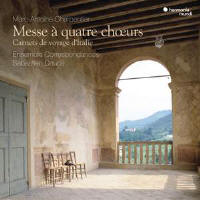Texte paru dans: / Appeared in: |
||||
|
Outil de traduction ~ (Très approximatif) |
||||
|
Reviewer: J.
F. Weber
The subtitle is
“An Italian Travel Diary,” for Marc-Antoine Charpentier is the only French
composer of his generation to have travelled to Italy, and all of his
surviving music postdates that journey. He spent three years in Rome, but
the other cities he visited en route are merely the subject of speculation,
and the composers featured here to illustrate his exposure to Italian music
have been chosen on that basis. Tarquinio Merula (1595–1665) was at Cremona
cathedral at the time, represented by this motet recently recorded by
Maurizio Schiavo (Fanfare 41:1). Maurizio Cazzati (1616–1678) was at San
Petronio basilica in Bologna, so this motet in honor of the patron saint,
apparently a first recording, is a good choice.
Francesco
Cavalli (1602–1676) was maestro at San Marco in Venice, so one of two major
works on the program is the Magnificat from the 1656 publication that
featured his Messa Concertata. It has been recorded under Thomas Hengelbrock
(27:5) and Bruce Dickey (23:3). While it is identified as an eight-voice
work, it calls for two choirs of voices and instruments as well as a third
instrumental choir.
The Venetian
work for three choirs leads to the predilection for polychoral Masses that
Charpentier witnessed in Rome, illustrated by the work of two composers.
Orazio Benevoli is well known on records (42:1), and the Mass of which one
movement is heard here has been recorded complete by Hervé Niquet (44:1).
More unusual is the recorded début of Francesco Beretta (c. 1640–1694),
whose Mass for 16 voices is also heard here, but only four movements (or
six, if the Kyrie is counted as three). Charpentier brought the 16 partbooks
of this Mass (now lost) back from Italy and prepared the manuscript which is
its sole surviving source. He also prepared a critique of Beretta’s
“astonishing skill and confidence” (as it says in the notes) in handling so
many voice parts. A complete recording would have been a better idea.
It becomes
clear why Charpentier’s polychoral Mass is featured on this program over 10
others that he wrote. The work came late to records when Jean-Claude
Malgoire finally recorded it for Erato in 1990, but it was never submitted
for review. It was later recorded by Jeffrey Skidmore (27:6) and Christopher
Jackson (29:3). It is the best demonstration of the lessons Charpentier
learned during his sojourn in the Eternal City. I found Skidmore’s version
superb, but Sébastien Daucé is inspired by the context in which he places
the work, composed not long after the composer’s return from Rome. It is the
only polychoral Mass we have from 17th-century France, for Charpentier’s
contemporaries had no appreciation of the very different character of
Italian music at the time. Daucé has chosen to precede the Mass with the
symphonie from a later Mass, since there was no comparable movement in this
Mass, and to follow it with the prayer for the king (H. 285), invariably
included in sung Masses of the era. He also leads off the disc with a very
modest little antiphon for three unaccompanied voices, perhaps to let the
splendor of the program unfold gradually. I have to mention one composer who is ignored in the notes. Giuseppe Giamberti (c. 1600–c. 1663) found his way into my collection with three antiphons on a Vespers CD, and the Fanfare Archive shows another single minor work, so this little antiphon (as its title seems to indicate) for strings does little to enlarge our appreciation of the obscure composer. Taken overall, Daucé’s reconstruction of a hypothetical “Italian travel diary” of Charpentier is brilliantly realized, and the juxtaposition of these 17th-century composers enlightens us more than a disc focused on any of the composers would do. The quality of the performances completes his success. Highly recommended as an unusually successful compilation around a theme.
| ||||
|
||||
|
|
|
|||
|
Cliquez l'un ou l'autre
bouton pour découvrir bien d'autres critiques de CD |
||||




